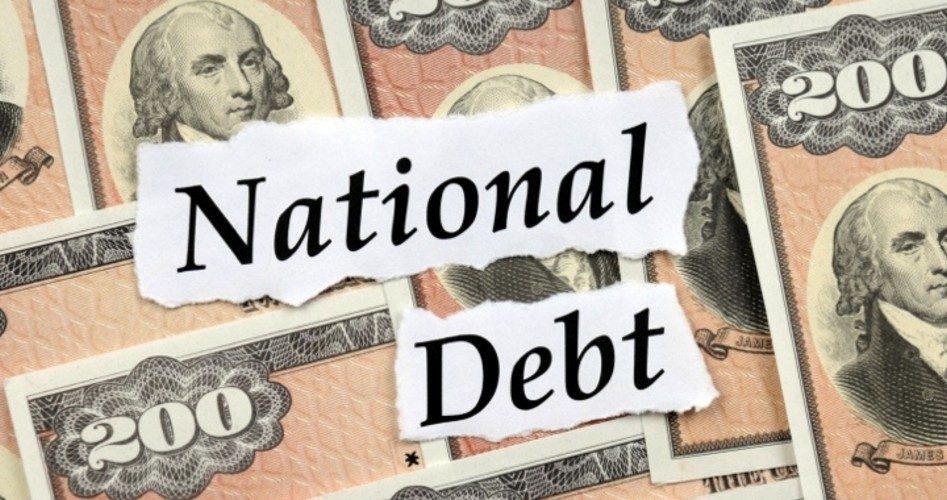
In June, the Congressional Budget Office (CBO) put the U.S. government’s debt at a staggering $18 trillion. But according to a former U.S. comptroller general, the actual debt is $65 trillion — more than triple the official figure — and it isn’t going to improve as long as politicians continue to put their personal and partisan interests ahead of the nation’s.
David Walker, who served as the head of the Government Accountability Office (GAO) from 1998 to 2008, told John Catsimatidis, host of “The Cats Roundtable” on New York radio station WNYM, that there’s much more to the debt than just what the government currently owes.
“If you end up adding to that $18.5 trillion the unfunded civilian and military pensions and retiree healthcare, the additional underfunding for Social Security, the additional underfunding for Medicare, various commitments and contingencies that the federal government has, the real number is about $65 trillion rather than $18 trillion, and it’s growing automatically absent reforms,” Walker said Sunday.
Even Walker’s calculations may understate the seriousness of the situation. Earlier this year Boston University economics professor Laurence Kotlikoff told the Senate Budget Committee that when all future financial obligations are taken into consideration, as of 2014 — when the CBO claimed the national debt was $13 trillion — Uncle Sam owed a whopping $210 trillion.
{modulepos inner_text _ad}
In truth, it is impossible to know just how deep the pool of red ink in Washington is. All projections of future debt are based on certain assumptions about economic growth, tax rates, interest rates, entitlements, discretionary spending, and so on. If any of these changes — and all of them probably will — the actual debt may end up being considerably larger or smaller than forecast. Nevertheless, even by the CBO’s reckoning, there is a serious problem.
“If you don’t keep your economy strong, and that means to be able to generate more jobs and opportunities, you’re not going to be strong internationally with regard to foreign policy, you’re not going to be able to invest what you need to invest in national defense and homeland security, and ultimately you’re not going to be able to provide the kind of social safety net that we need in this country,” explained Walker.
Of course, the bipartisan consensus in favor of a “strong,” interventionist foreign policy and a “social safety net” is precisely the reason that Washington is drowning in IOUs.
“The deep hole we have for ourselves is much worse than politicians want to talk about, so they keep kicking the can down the road, hoping that somehow it will go away, but it cannot go away without economic growth and that cannot happen until we stop the endless wars and stop the endless programs for we promise people something for nothing,” Paul Sheldon Foote, an accounting professor at California State University, Fullerton, told Press TV Sunday.
Indeed, Congress and President Barack Obama just kicked the can down the road even further, suspending the federal government’s debt ceiling until March, a move that almost instantly increased the national debt by $339 billion. That’s $339 billion more that taxpayers will now have to pay back — or, worse, that the Federal Reserve will inflate the currency to pay off.
“Skyrocketing federal debt is a major reason why other counties are challenging the dollar’s world reserve currency status,” observed Norm Singleton of Campaign for Liberty. “Foreign investors are justifiably worried that the Fed’s need to monetize the federal debt will result in a collapse of the dollar’s value and a major economic crisis.”
Senator Rand Paul (R-Ky.) also singled out the central bank for enabling politicians’ profligacy. The Fed, he told Breitbart News Daily, is working “hand in glove” with deficit spenders. “You can’t have a big debt without the Fed,” he said.
Paul also pointed to an “unholy alliance” between Republicans and Democrats “that agrees to endless debt-ceiling increases so the conflicting priorities of Right and Left can both enjoy lavish funding,” wrote Breitbart. “Military spending for the Right, plus welfare spending for the Left, combine to form a ‘guns and butter’ spending policy, making a mockery of the old principle that politicians must choose between funding guns or butter.”
“The debt gets worse under Republican presidents, and it gets even worse under Democrats. We doubled the debt under Bush, and we’re doubling it again under Obama,” Paul said, promising to veto future debt-ceiling increases if he’s elected president.
The only way out of the looming debt crisis is to stop spending so much, and the best way to do that is to repeal — not reform — unconstitutional federal programs while adopting a noninterventionist foreign policy that restores decisions of war and peace to Congress rather than the president. Unfortunately, getting politicians who believe their reelection depends on kowtowing to moochers and the military-industrial complex to enact such policies is an arduous task, especially when Americans themselves have, in Walker’s words, “lost touch with reality” when it comes to government spending.
Still, Walker — one of the founders of No Labels, a nonpartisan organization whose website says its primary goal is to get the executive and legislative branches to “solve the nation’s problems” — is hopeful that the task can be accomplished.
“You can be a Democrat, you can be a Republican, you can be unaffiliated, you can be whatever you want,” he said, “but your duty of loyalty needs to be to country rather than to party, and we need to solve some of the large, known, and growing problems that we have.”




